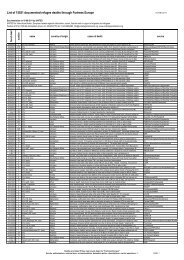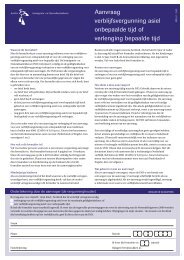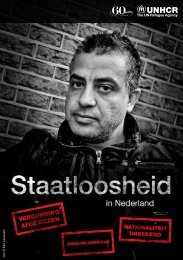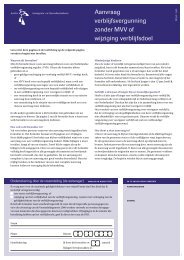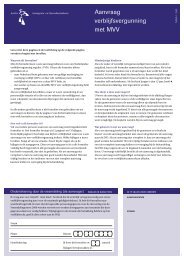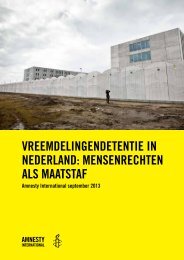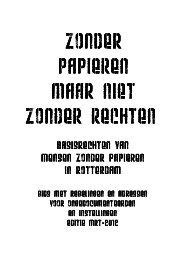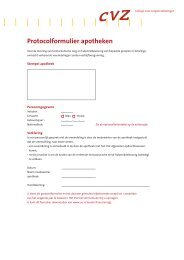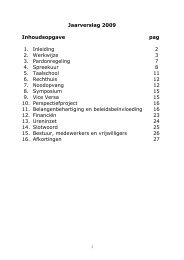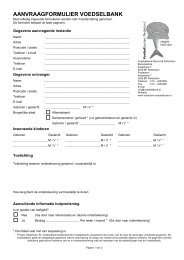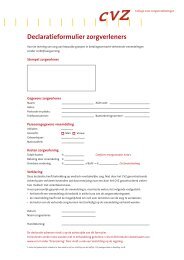Handboek voor begeleiders van vluchtelingen en ... - Stichting ROS
Handboek voor begeleiders van vluchtelingen en ... - Stichting ROS
Handboek voor begeleiders van vluchtelingen en ... - Stichting ROS
You also want an ePaper? Increase the reach of your titles
YUMPU automatically turns print PDFs into web optimized ePapers that Google loves.
especially the powers or arrest or det<strong>en</strong>tion. The code obliges law <strong>en</strong>forcem<strong>en</strong>t<br />
officials to protect human dignity and respect the human rights of all in the<br />
performance of their duties. The code addresses the narrow circumstances justifying a<br />
use of force by law <strong>en</strong>forcem<strong>en</strong>t, confid<strong>en</strong>tiality, prohibition on acts or acquiesc<strong>en</strong>ce<br />
in acts of torture or inhumane treatm<strong>en</strong>t, protection of health of persons in their<br />
custody and other matters.<br />
• Principles of Medical Ethics rele<strong>van</strong>t to the Role of Health Personnel,<br />
particularly Physicians, in the Protection of Prisoners and Detainees against<br />
Torture and Other Cruel, Inhuman or Degrading Treatm<strong>en</strong>t or Punishm<strong>en</strong>t:<br />
These principles were adopted by the UN G<strong>en</strong>eral Assembly in 1982 and apply to both<br />
civil and criminal prisoners. The principles require physicians and health personnel to<br />
provide prisoners and detainees with protection of their physical and m<strong>en</strong>tal health and<br />
treatm<strong>en</strong>t of the same quality and standard as afforded to those not imprisoned or<br />
detained. They oblige health personnel and physicians to not <strong>en</strong>gage in any actives,<br />
either passively or actively, which involve torture or inhumane or cruel treatm<strong>en</strong>t.<br />
• Body of Principles for the Protection of All Persons under any Form of Det<strong>en</strong>tion<br />
or Imprisonm<strong>en</strong>t: In approving the Body of Principles in 1988, the UN G<strong>en</strong>eral<br />
Assembly urged that every effort be made to <strong>en</strong>sure respect for these principles<br />
worldwide. They apply to all persons under any form of det<strong>en</strong>tion or imprisonm<strong>en</strong>t.<br />
The principles define “detained person” as any person deprived of personal liberty<br />
except as a result of conviction for an off<strong>en</strong>se. “Det<strong>en</strong>tion” means the condition of a<br />
detained person as previously defined. The principles provide that all persons under<br />
any form of det<strong>en</strong>tion should be treated humanely and with dignity. Detained persons<br />
should be separated from those awaiting trial or who have be<strong>en</strong> convicted. The<br />
principles address both procedural guarantees relating to det<strong>en</strong>tion and conditions of<br />
det<strong>en</strong>tion, including the right to information and counsel, the prohibition against<br />
torture or inhumane or cruel treatm<strong>en</strong>t, the right to family visits and the right to<br />
medical care.<br />
• Basic Principles for the Treatm<strong>en</strong>t of Prisoners (1990): These principles were<br />
adopted by the UN G<strong>en</strong>eral Assembly in 1990 and establish basic standards for the<br />
treatm<strong>en</strong>t of persons in prison, emphasizing respect for dignity, religious beliefs and<br />
culture.<br />
• Rules for the Protection of Juv<strong>en</strong>iles Deprived of their Liberty: These rules,<br />
adopted by the UN G<strong>en</strong>eral Assembly in 1990, apply to all persons under 18 years of<br />
age. The rules are int<strong>en</strong>ded to establish minimum standards accepted by the United<br />
Nations for the protection of minors deprived of their liberty consist<strong>en</strong>t with human<br />
rights principles. The rules address the managem<strong>en</strong>t of juv<strong>en</strong>ile facilities, specifically<br />
on the following issues: records; admission, registration, movem<strong>en</strong>t and transfer;<br />
physical <strong>en</strong>vironm<strong>en</strong>t and accommodation; education, vocational training and work;<br />
recreation; religion; medical care; notification of illness, injury and death; contacts<br />
with the outside world; limitation of physical restraint and the use of force;<br />
disciplinary procedures; and inspections and complaints.<br />
• UNHCR Guidelines on Policies and Procedures in dealing with Unaccompanied<br />
Childr<strong>en</strong> Seeking Asylum: These guidelines, issued by the UNHCR in 1997,<br />
provide guidance to governm<strong>en</strong>tal and non-governm<strong>en</strong>tal personnel alike in dealing<br />
66




